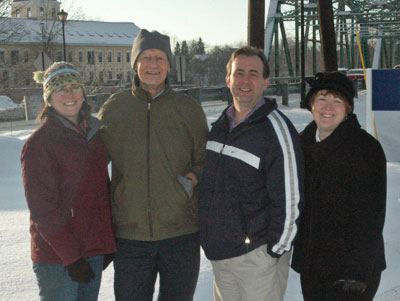The Fight for Self-Government in Topsham
Share
 Greens in Maine keep Town Meeting going
Greens in Maine keep Town Meeting going
by John Rensenbrink,†Maine Independent Green Party
In the past year there came a troubling challenge to fundamental Green values of democracy in my hometown of Topsham, Maine. In the struggle that ensued, it is apparent how basic, from the ground up, the long struggle is for real democracy at every level, and how all struggles at all levels are deeply connected.
The challenge came from a strong effort by influential notables in Topsham to abandon our town meeting form of government and substitute it with a seven-person Town Council. The notables had successfully persuaded the town to establish a nine-person Charter Commission with the seductive argument that the town, having grown three times its size in thirty years, needed to have a close look at its form of government. They then worked successfully to run for the Commission. The Select Board appointed three people, while residents elected six positions, but it seemed only two members would be willing to keep our Town Meeting.†
A strong local government based directly on the sovereignty of the people is fundamental to self-governance.†
The Commission began meeting in January 2008. Already at their second meeting, they publicly announced their intention to come up with a town council form of government abandoning Town Meeting. They would work out the details in the next several months in time for it to be voted on in November during the presidential election cycle. This appalled residents partial to Town Meeting. We felt it would have been far more appropriate for a Charter Commission to weigh the advantages and disadvantages of various forms of government before coming to a conclusion. This would have put our existing town meeting form of government at least on an equal basis with other governmental possibilities during the months of discussion leading to the election.
A group of residents formed to resist the Charter Commission’s plan. We had a strategy – to not help improve the Charter Commission’s cumbersome proposal, to attend and express our opinion at their locally televised meetings, and to make a point of saying the Commission was headed in the wrong direction.
Following an initial meeting several of us cohered to do the hard labor: organizing, advocating, advertising, door-to-door canvassing, interviewing, TV programming, putting up signs all over town, phone calling, emailing, web-siting, fundraising, and participating in the one and only debate – all the things needed for a †strong campaign. In our partisan political loyalties, we were Republicans, Democrats, Greens, and Independents.
For the last two and a half months before the election on November 4, we gradually gained momentum. There were solid connections with traditionalists who did not want a change, progressives who valued the scope and meaning of town meetings, and those who though not attached to Town Meeting nevertheless did not like the version of a Town Council proposed by the Commission. Crossing many political, economic and cultural lines, we became The Committee to Vote No on the Charter (CVNC).
It was difficult to be optimistic when the regional daily newspaper, the Times Record, endorsed a Town Council, despite numerous op-ed pieces against it in their newspaper and the CVNC meeting with the editorial board of the paper. Another regional paper, the weekly Forecaster, did the same. To counter the daily newspapers, the coalition put special CVNC flyers, placed ads, and contributed commentary in The Town Cryer, a local monthly, which is mailed gratis to every household in Topsham. This strategy proved very successful.
Still, a formidable hurdle was reaching out to new residents not familiar with Town Meeting. For the past 20 years, Topsham has been the fastest growing town in Maine, increasing from 4000 inhabitants in 1975 to over 11,000 today. A flood of people would be voting (it was the Obama election) but many unknowledgeable to Topsham ways. Also troublesome was the language of the referendum on the ballot. It invited a Yes vote if anyone was unsure how to vote and hadn’t paid much attention to the public debate.
Come election night, the counting in Topsham on our referendum was done by 9:00 p.m. We won! Hallelujah! It was a convincing victory with a 600-vote majority of 2950 to 2325.
CVNC immediately called for the creation of an ad hoc town committee to come up with recommendations to make Town Meetings more accessible and participatory. The hope is to incorporate a code of ethics and recall provisions in our current form of government, forestalling any attempt to depart from Town Meeting government. The Board of Selectmen approved our proposal for a Topsham Government Improvement Committee on December 4. Four members of the CVNC have applied to be on it, including myself, and chances are good we will be appointed.†
We will strive to make Topsham’s Town Meeting a strong vehicle for community participation in government and for unity in the face of stringent economic times. Securing the basis for self-government also then provides the basis for greater degrees of local self-reliance in meeting social, economic, and ecological problems. We can try to work this into emerging efforts for regional cooperation as we move along.
A strong local government based directly on the sovereignty of the people is fundamental to self-governance. It ties in with community self-reliance in the basics of life, which in turn ties in with a solid and creative foundation for effective democracy at the regional, national, and global levels.

The leading members of the ìCommittee to Vote No on the Charterî (CVNC) who defeated a Charter Commissionís efforts to abolish Town Meeting in Topsham, Maine. From left to right, Angela Twitchell, John Rensenbrink, Jim Howard, and Liz Armstrong. Photographer: Charles Crosby




